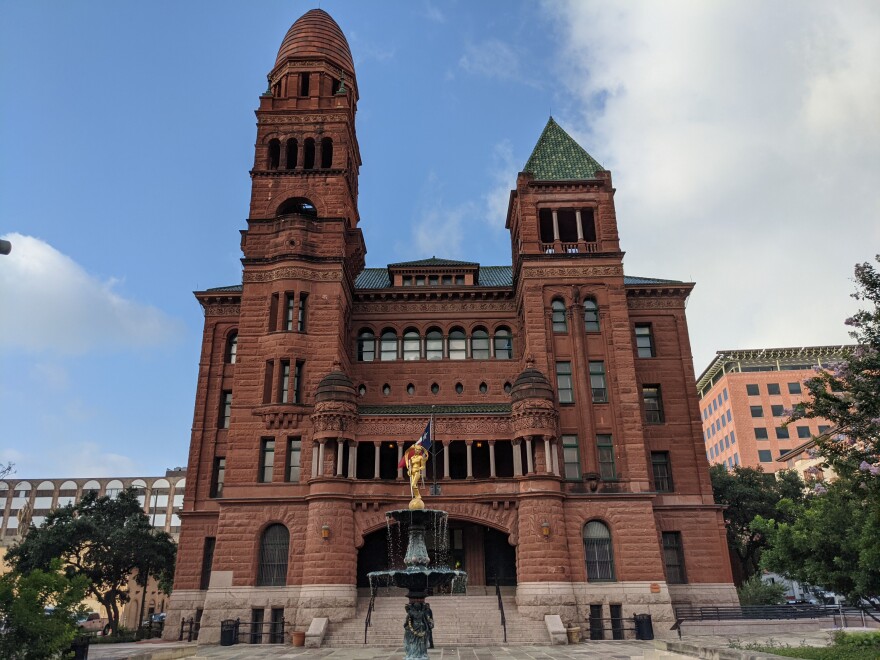When Judge Antonia Arteaga was elected to a state district court in Bexar County, she was the only Latina wearing the robes in the civil courts there.
“Oh, wow. Things are so different than they were in 2009. Two of my first four years, I was the only Latina here,” she said.
But that was 15 years ago, and the story is very different now.
“Now we have 14 civil district courts. And as of Jan. 1, 13 of those 14 courts will have a woman presiding — Latinas presiding,” she said.
While only a handful of women were judges the year Arteaga was elected — now the roles are reversed — and more that 92% of all state district and appellate judges in Bexar County are women. Bexar County leads the trend that has been sweeping the state’s largest counties.
“I think that says a lot about where we live the community we live in and now that the face of the judiciary looks more like community we live in,” she said.

While only 26% of the state judgeships are female, Travis County boasts 85% of its judges as women, while Harris and Dallas both have around 70%.
Texas scores poorly in rankings for gender equality — a tepid 27th according to U.S. News and World Report. But in its largest counties, the Lone Star State’s courtrooms are celebrating a golden age of elected women judges.
For hundreds of years, men — and more often than not, white men — have run courts. The largest urban counties in Texas are changing that and bucking both state and national trends.
“I do think those are surprising figures in that women continue to be underrepresented on both state court benches and federal benches across the country,” said Alicia Bannon, director of the judiciary program for the Brennan Center for Justice.
The number of women jurists has been growing, and law schools have admitted more women than men for years. But women’s legal career trajectories narrow, Bannon explained, with fewer judgeships and high-level law partnerships.
Most of the women judges in the counties TPR looked at were Democrats but Bannon said it was hard to deduce if, nationwide, the party was more likely to encourage women to become judges.
“It actually can be hard to disentangle how party dynamics interact with diversity on the bench and different paths to the benches because Texas is unusual in using partisan elections to choose their judges. So most states that use judicial elections, use nonpartisan elections where a party label doesn't appear on the ballot,” she said.
The state Supreme Court is all Republican, with women making up only a third of its members. Texas’ Court of Criminal Appeals boasts five Republican women to four Republican men.
The state legislature — a Republican run body for 20 years — ranks 35th in gender parity nationwide.
In Bexar County, though, the only woman to lose to a man in 2022 was a Republican.
On the third floor of the Cadena Reeves Justice Center, the slow, if not sedate pace of a courtroom without a trial going on is interrupted briefly. “All rise, the 437th court room is now in session,” yelled a court bailiff.
Judge Melissa Skinner presides for a few more days in the 437th Criminal Court. She was voted out for Democrat Joel Perez.
But another woman — a Democrat — was elevated to a judge. “Hi, I’m Kristina Escalona. I’m one of the prosecutors,” she said, introducing herself to a family.
The parents stand and move past several kids to speak with her in the aisle. Their one-year old son was shot. The boy lived but the man the state accused awaits trial and has a hearing.
“I am going to show you to a room so we can get you situated,” she said, motioning towards the exit.
The entire family stands momentarily before it becomes clear she just wants to speak with mom and dad. They walk to a small room of the anteroom.
Escalona explains the long legal process ahead of them — how the investigators still need to file many documents and how there are many hearings after this one. She told them they don’t necessarily need to be there for each hearing, and any important settings they will be notified.
“Just to calm them down and not make them think that their case is endangered because it takes that long,” she said later in an interview.
She won’t be going forward in the case as she is sworn in on the first of the new year, but she introduced them to a victims advocate who will stay in touch throughout.
Escalona has worked as a prosecutor for 12 years, and she said helping victims of crime directly will be an area she misses when she leaves the DA's office. But as a judge she will help all court parties.
Escalona said she was encouraged to run for a judgeship early in her career. The past decade has seen many victories for women and for Latinas in Bexar County. People in her circle talked about it often. But she put it off, wanting more experience.
“I did not want to come into the bench or the judiciary and have people even think, well, she took advantage of a trend,” she said.
She says regardless of the trend she knows the judges she will join are all highly qualified.
“What I always think is whether you are male or female, bottom line is, you have the knowledge, you have the skill set, you have the demeanor and the perspective,” said Escalona. ”And first and foremost, you are able to treat everybody who enters your courtroom with respect. And those are the qualities that everyone needs in a judge, no matter no matter your gender.
It isn’t clear if Bexar and other urban counties are the future of the Texas’ Judiciary, but they are doing the lion's share of correcting the state’s imbalance in the courtroom.


